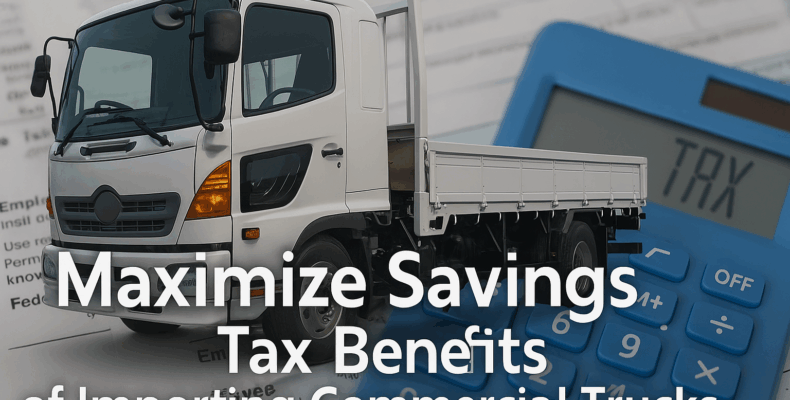Importing a Japanese used commercial truck can do more than just boost your business. In many countries, it can also lower your tax bill. That’s right—tax benefits for commercial vehicle imports are available in various regions, helping businesses and independent operators save big on operations.
Whether you are starting a logistics company, upgrading your fleet, or expanding into rural delivery, understanding these tax advantages will help you make smarter financial decisions.
Let’s explore how you can take full advantage of them when importing trucks from Japan.
💡 Why Choose Japanese Trucks for Commercial Use?
Japanese trucks—like those from Hino, Isuzu, Mitsubishi Fuso, and Nissan Diesel—are known for:
-
Long-term durability
-
Fuel efficiency
-
Easy maintenance
-
High resale value
These features already make them a cost-effective choice. But when you add import tax breaks, they become even more appealing.
💰 Top Tax Benefits When Importing Commercial Vehicles
✅ 1. Import Duty Exemptions or Reductions
Many countries reduce or waive import duties on commercial vehicles. For example:
-
Tanzania and Kenya offer lower duty rates for business-use vehicles.
-
Uganda allows exemptions on certain trucks used for industrial purposes.
-
Caribbean nations may classify commercial trucks as capital equipment, reducing overall tax.
Before importing, check how your country defines “commercial use.” Registration under a business entity may be required.
✅ 2. VAT or Sales Tax Refunds
If you’re registered for Value Added Tax (VAT) or a similar tax in your country, you may claim a refund on the import.
-
This applies if the truck is used strictly for business.
-
Keep all documents, including the invoice, bill of lading, and import declaration.
-
Submit refund applications within the allowed timeframe.
Ask a licensed customs broker for help to avoid delays or rejection.
✅ 3. Accelerated Depreciation and Tax Deductions
Imported commercial vehicles often qualify for accelerated depreciation under local tax codes.
-
This allows you to deduct more value in the first few years.
-
It reduces your taxable income and boosts cash flow.
-
Some countries even allow 100% write-off in the first year.
Make sure your accounting method matches the local tax authority’s rules.
✅ 4. Duty-Free Status Under Trade Agreements
Your country may have a trade agreement with Japan or Asia-Pacific countries that includes vehicle import benefits.
-
Examples: EPA, FTA, COMESA, or CARICOM agreements.
-
These agreements may lower or eliminate import duties.
-
Proper certificate of origin may be required.
This is especially useful for small businesses and logistics startups looking to reduce overhead.
📝 How to Claim Tax Benefits
Follow these steps to get your maximum benefit:
-
Register the truck under a business name.
-
Choose a trusted exporter who provides full documentation.
-
Consult a local customs agent or tax consultant.
-
File claims promptly after importation.
-
Keep digital and paper records of all transactions.
👉 For reliable export support, see:
Top 5 Trusted Japanese Used Truck Exporters for Global Buyers
These exporters offer correct paperwork, emissions compliance, and fast shipping—making the tax process smoother.
🌍 Country-Specific Examples of Tax Relief
-
Philippines: Allows VAT exemption for trucks under certain programs.
-
South Africa: Offers tax deductions if trucks are used in rural development.
-
Pakistan: Provides duty reductions for transporters under SME schemes.
-
Bangladesh: May allow bonded warehouse import with deferred tax.
Always verify current laws with your local tax authority.
🧾 Final Thoughts
Importing a Japanese commercial truck not only gives you access to world-class quality and performance—it also opens the door to smart tax savings.
By taking the right legal steps, registering under business use, and keeping your documents organized, you can enjoy reduced import costs, VAT refunds, and tax-deductible depreciation.
Be proactive. Understand your country’s rules. And work with experienced exporters who can guide you from shipping to customs clearance. Your next Japanese truck could be your smartest business investment yet.
